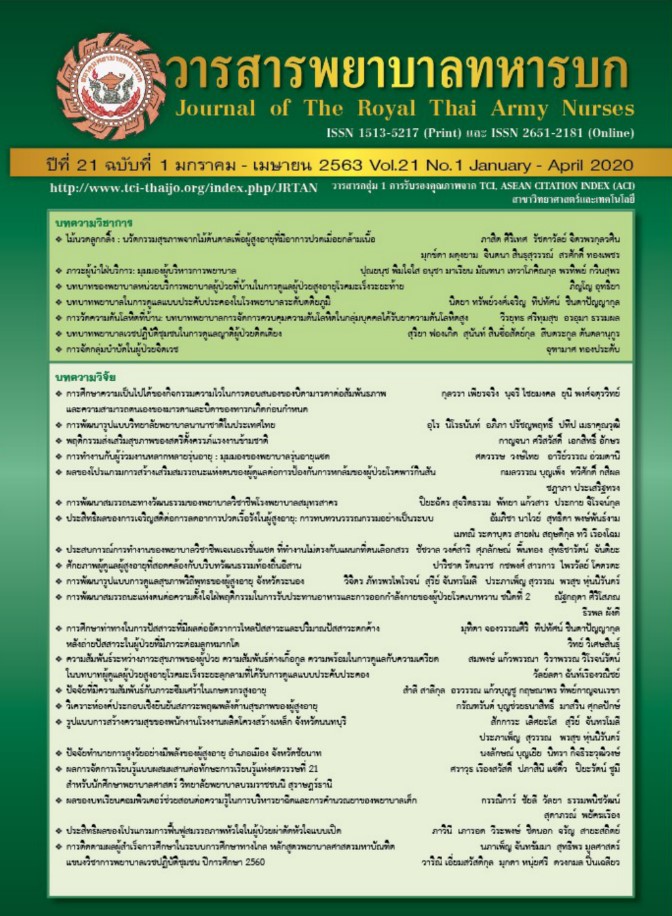Development of a Depressive Disorder Prevention Model in the Elderly of Health Region 5
Keywords:
the model of prevention, elderlies, depressive disorderAbstract
The purpose was to develop the Model of prevention of the depressive disorder in elderlies in Public Health Region 5. The research was Research and Development program. Example group were elderlies upper 60 years. The instruments were the assessments of stress, automatic negative thoughts, and happiness in the elderly lives. The statistics were mean ( ), Standard Deviation (S.D.), and dependent t-test. The results revealed that the factors of the prevention of the depressive disorder influenced the depressive condition has a statistically significant difference at the level of .05 The processes were as follows: 1) Stress management, self-discipline and community management, and self-understanding, 2) Self-training of breath, 3) Detaching from self-awareness, thoughts, emotions, and cravings, 4) Being conscious and deleting negative thoughts in a short while, 5) Consciousness training along with movement by doing a yoga, and 6) Adjusting communication, compassion, forgiveness, and self-love. The appropriateness assessment of the program was at the high level( x̄ = 4.06, S.D = 0.14), and possibility assessment was at the highest level ( x̄ = 4.20, S.D. = 0.11). After using program, happiness,stress and negative thoughts of elderlies in the experimental group had a statistically significant difference at the level of .05 Also, the results recommended that the program can be applied as a guideline for the prevention and can foster good health that to be the elderlies in the future appropriately.
Downloads
References
2. Wongpakarun N. Elderly care guideline manual: relexing of depresstion. Edition Nonthaburi : Open world Publiching house company ; 2016. (in Thai)
3. Beck, D.A., & Koenig, H.G. Minor depression; A review of the literature. Internal Journal Psychiatry in Medicine 1996; 26(2): 177-209.
4. Wongpanarak N,Chaleoykitti S. Depression: A Significant mental health problem of elderly. Journal of The Royal Thai Army Nurses 2014 ;15(3):23-31 (in Thai)
5. Lueboonthawatchai P. Psychosocial Treatment for Depressive Disorder. Tanaplass Company 48/26-31 tanonbuntustong pratumwan Bangkok. 2010.(4): 69-77. (in Thai)
6. Department of Mental Health, Mindfulness-Besed Therapy and Counseling (MBTC) Manual. (2016,Aug) Bangkok : rongphim beyond publishing (in Thai)
7. Wongphiromsan Y. Five Depr ession warning signs in Depressive Disorder of elderlies to see doctor. Ch7 News. 2018,Febuary 24. (in Thai)
8. Maslow, Abraham. Motivation and Personality. New York: Harper and Row; 1970.
9. Suwan P. Positive Psychology,Happiness, Positive Health Assets:The needs for Further. Reesarches; 2018 (in Thai)
10. Bureau of Mental Health Promotion and Development, Department of Mental Health. A lecturer’s guide for organizing 5-dimensional happiness activities for the elderlies in the community. Nonthaburi: rongphim samnakngan phra phut satsana haeng chat; 2018. (in Thai)
11. Lueboonthawatchai O. Psychosocial Treatment for Depressive Disorder. Tanaplass Company 48/26-31 tanonbuntustong pratumwan Bangkok. 2010.(4): 111-135.(in Thai)
12. Kitsanaprakonkit T. Mediation Therapy in Psychiatry and Mental Health. 1st ed. Kornkan: Kornkan University; 2009. (in Thai)
13. Satayatram C. et al. Mental Health Nursing and Psychiatric. 1st ed. Bankok: Tanaplass Company; 2013. (in Thai)
14. Sriphathay W. Guidelines for Prevention of Depressive problem for Elderly Prathay District Nakornrachchasrima Province. Maharachchanakornsrima Hospital. 2016; 39(3): 147-154. (in Thai)
15. Chantharamoree S. Exercise for Elders Social-bound Philosophy of Economy to Conduct the way of Life. Proceeding. The 12nd National Research Conference Research and innovation in Thai economy. Western University. 2018, March 7-8. P.208-212. (in Thai)
Downloads
Published
How to Cite
Issue
Section
License
บทความหรือข้อคิดเห็นใดใดที่ปรากฏในวารสารพยาบาลทหารบกเป็นวรรณกรรมของผู้เขียน ซึ่งบรรณาธิการหรือสมาคมพยาบาลทหารบก ไม่จำเป็นต้องเห็นด้วย
บทความที่ได้รับการตีพิมพ์เป็นลิขสิทธิ์ของวารสารพยาบาลทหารบก
The ideas and opinions expressed in the Journal of The Royal Thai Army Nurses are those of the authors and not necessarily those
of the editor or Royal Thai Army Nurses Association.






